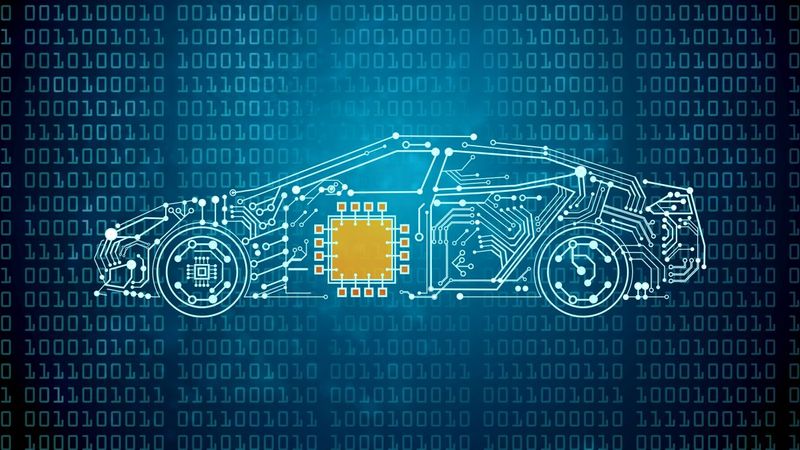Supercomputers to Control Cars of the Future
The CeCaS research project creates processors, interfaces and system architectures for highly automated networked vehicles - KIT develops hardware accelerators and benchmarking software

Computer systems in future highly automated and networked cars must perform sophisticated calculations, process huge amounts of data and achieve maximum reliability. (Icon graphic: © kaptn – stock.adobe.com, KIT)
The highly automated and connected vehicles of the future will require powerful computer systems that perform sophisticated calculations and process huge amounts of data. 30 partners from industry and research are developing suitable processors, interfaces and system architectures in the CeCaS project. The Karlsruhe Institute of Technology (KIT) is involved with two institutes in the project coordinated by Infineon. The Federal Ministry of Research supports CeCaS within the MANNHEIM initiative.
The next generations of vehicles will be increasingly automated and networked in order to move more and more autonomously on the road and gradually relieve drivers. This requires enormous computing power, which only the most powerful computer systems can provide - whether in the vehicles themselves, along the roads or in the higher-level data centers. In addition to internal communication systems connected to the outside world, the vehicles require a central computer. This, in turn, consists of sub-components that perform sophisticated calculations, process huge amounts of data and have to achieve maximum reliability.
KIT and TUM have assumed scientific coordination
In the CeCaS (stands for: CentralCarServer) research project, 30 partners from industry and research are working on the architectures, the software engineering principles and the forms of implementation for future high-performance computers in cars. Infineon Technologies AG is responsible for coordinating the overall project. The KIT with Professor Jürgen Becker, head of the Institute for Information Processing Technology (ITIV), and Professor Jörg Henkel, head of the research area Embedded Electronic Systems at the Institute for Technical Informatics (ITEC-CES), as well as the Technical University of Munich ( TUM) with Professor Alois Knoll, Head of the Chair for Robotics, Artificial Intelligence and Real-Time Systems (AIR).
"The development of energy- and cost-efficient high-performance computers with full automotive qualifications, which meet the enormous demands on computing power and complexity in a scalable manner, makes a decisive contribution to the future viability and technological sovereignty of the German automotive industry," says Becker. In CeCaS, automotive supercomputing is created that meets the highest standards of safety and reliability. The project consortium designs processors, interfaces and system architectures. A flexible software environment is tailored to the requirements of the latest algorithms in automobiles - especially, but not only, for the use of artificial intelligence (AI).
Hardware accelerators enable highly effective image processing
In CeCaS, the KIT has taken over the design of novel multi-purpose hardware accelerators for highly effective image processing including the integration of reliable AI in the automobile. The innovative accelerators are connected via high-speed interfaces and integrated into the high-performance processors. The researchers are particularly focusing on the AI components between the sensor nodes and the central computer. In addition, the KIT is working within CeCaS on new development tools for the analysis and compliance with real-time criteria as well as on comprehensive benchmarking software for evaluating the hardware accelerator.
"Progress in automotive technology is directly dependent on progress in computer technology and information technology - but above all on the ability of the automotive industry to use modern chip technologies for itself," explains Becker. "CeCaS supports the German automotive industry in playing a leading role in global competition, even in the digital age."
About CeCaS
The Federal Ministry of Education and Research (BMBF) is funding CeCaS in its MANNHEIM initiative, named after the birthplace of the automobile, with around 46 million euros. The total project volume is almost 90 million euros. CeCaS is scheduled for three years.
The 30 cooperation partners of the MANNHEIM-CeCaS project are: Bosch, Continental Automotive, ZF Friedrichshafen, Hella, AVL Software & Functions, Ambrosys, Infineon Technologies AG (coordination; with Infineon Technologies Dresden GmbH & Co. KG and Infineon Technologies Semiconductor GmbH), core concept , Berlin Nanotest and Design, Missing Link Electronics, Inchron, Glück Engineering, STTech, Steinbeis ZFW, Swissbit Germany, Karlsruhe Institute of Technology (KIT) with the institutes ITIV and ITEC-CES, FZI Research Center for Information Technology, Technical University of Munich with the chairs AIR , LIS and SEC, Munich University of Applied Sciences, Lübeck University, Chemnitz University of Technology, Fraunhofer ENAS, IMWS, IPMS and IZM.